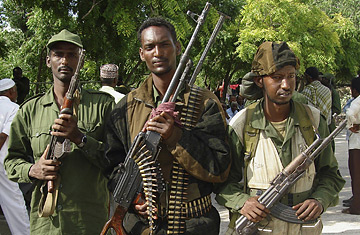
Government soldiers stand inside the former Supreme Court compound in Somalia's capital Mogadishu, December 29, 2006.
Our driver barrels past the building and our security — a pickup full of militia gunmen — follows in our 60 mph dust cloud. The car bounces over several massive potholes, and suddenly we're looking out at the sea over a rocky harbor where a couple of rusted tankers lie in water the color of malachite. The skeleton of a large building looms on a headland overhead. "The Aruba Hotel," says Fanah. "This was once the eighth or the ninth finest hotel in Africa." The tour continues.
"That's the Bank of Somalia. That's the Ministry for National Heritage. That's the American embassy — there used to be a camera right out, attached to the gates, I remember it. That's the French embassy." We pass a grand arch with a clear view of the port. "That's the port entrance — Italy's gateway to its new colony."
Mogadishu was once the center of East African trade, an Italianate city of universities and cafes on the Indian Ocean waterways that link Africa with the Arabian peninsula. Since the collapse of the last functioning government here in 1991, it has been better known as a crucible of bloody warlord anarchy, where 18 American soldiers lost their lives in 1993, and where journalists still visit at their peril. You don't move without an escort of gunmen, you don't stop anywhere for more than a few minutes, you keep your tinted windows closed and you drive to the limits of your vehicle. And yet, like Angkor Wat or south Manhattan after 9/11, the city has an irresistible hold on the journalistic imagination.
My guide, Fanah, is program director for a Western-funded non-profit called the Center for Peace and Democracy, which aims to "promote peace, democracy and support the community in decision-making and to develop a strategy to overcome the current awful situation in Somalia." He admits the organization's success has been limited. "Somali is a poor language," he smiles apologetically. "There is no Somalian word for democracy."
Over the last five months, Mogadishu had enjoyed its first respite from 15 years of clan war, after the Islamic Courts Union — an alliance of clerics and sympathetic warlords — drove the last four independent warlords out of the capital. The Courts won few fans for their attempts to ban music, soccer, cinemas and qat, the local plant traditionally chewed for its mild stimulant effect. But their success in imposing law and order, and their unexpected ability to rise above clan rivalries, won them almost universal respect.
As a democracy advocate, Fanah opposes the principle of an unelected government curbing his freedom. But he concedes that the Courts restored a semblance of normality to a people who had almost forgotten the experience of being able to move freely around their city. "I used to dream to be here," he says as we pass the Maba al Mukarama, another old Italianate colonnade. "It was one of those famous places. But then it became only a place for killers, and for 14 years I could not visit." Though they lived in a port city a mere 15 minutes walk from the shore, "some of my children had never seen the sea," Fanah adds. When the Courts removed the warlord's blockades that had barricaded the city into tiny, heavily armed enclaves, he took his kids to the beach. " 'Why is all this water?' my boy ask me. I had to explain him. He is 13."
Last week, Mogadishu dodged a bloodbath when the fighters loyal to the Courts left the city rather than fight the Ethiopian forces spearheading the drive by the internationally recognized Transitional Federal Government to take charge of the city. But with the Islamists gone, many in Mogadishu feared an immediate return to the rule of the warlords — not least because the several of them are ministers in the Transitional Government. Growing anxiety may be measured by the sound of weapons being test-fired at the arms market inside Bakara — a sign of brisk commerce, say old Mogadishu hands — but so far, the peace has held.
"Nobody trusts anybody," says Fanah on another of our drives. Then he points out the sturdy walls left standing in a destroyed building. "That is the places of the lunatics," he says grinning. "It was full of mad people. But now it is empty. Why not? The people outside are mad also." He slaps the driver's leg on the punchline and for a split-second I wonder whether the pair of them are laughing hard enough to crash. But then the driver guns the engine, and we flash past more ruins. "Somalis are very serious people," says Fanah.
